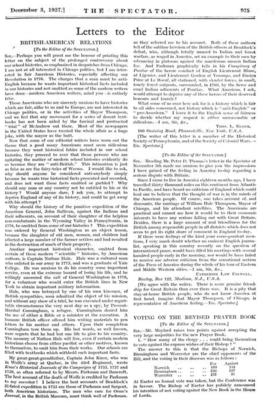Letters to the Editor
BRITISH-AMERICAN RELATIONS [To the Editor of the SPECTATOR.]
Sul,—Perhaps you will grant me the honour of printing this letter on the subject of the .prolonged controversy about our school histories, so emphasized in despatches from ChicagO.
I am not at all interested in Chicago polities, but I am inter- ested in fair American Histories, especially affecting our Revolution in 1776.. The charges that a man must be anti- English because he wants important historical facts included in our histories and not omitted as, some of the modern writers have done—modern American writers, mind you—is entirely false.
Those Americans who are sincerely anxious to have histories which are fair, alike to. us and to Europe, are not interested in ChicagO politics, or in the activities of Mayor Thompson, and we feel that any movement for a series of decent text- books has not been aided by the farcical and protracted " trial " of McAndrew out there. Most of the newspapers in the United States have treated the whole affair as a huge joke, with the mayor as the butt.
Now that some of our editorial writers have worn out the theme that a good many Americans must seem ridiculous because they want historical fables included in our school histories, they proceed to aver that those persons who are agitating the matter of modern school histories evidently do so because, they are " anti-British." This intimation is just as false as are the fairy-tales of Weems. I would like to ask, why should anyone be considered anti-anybody simply because he wants true historical facts presented and recorded, and does not want those facts omitted or garbled ? Why should any man or any country not be entitled to his or its history ? Would anyone dare, I ask you, to attempt to deprive England of any of its history, and could he get away with his attempt ?
Why should the history of the punitive expedition of the American General, John Sullivan, against the Indians and their adherents, on account of their slaughter of the helpless
non-combatants in the Wyoming Valley in Pennsylvania, in 1778, be omitted from some of our histories ? This expedition
was ordered by General Washington as an object lesson, because the slaughter of old men, women, and children had affected a large number of the farmer settlers and had resulted in the destruction of much of their property.
Another important historical character, omitted from certain of these modern " scientific " histories, by American authors, is Captain Nathan Hale. Hale was a cultured man who enlisted in our army in 1775, and was a graduate of Yale College. He was anxious to do his country some important service, even at the extreme hazard of losing his life, and he willingly answered the call of General Washington in 1776, for a volunteer who would enter the British lines in New York to obtain important military- information: Hale, who was betrayed by one of his own kinsmen, of British sympathies, soon admitted the object of his mission, and without any show of a trial, he was executed under regret- table circumstances the very next day as a spy, by Provost- Marshal Cunningham, a refugee. Cunningham denied him the use of either a Bible or a minister at the execution. A humane British officer offered him writing materials to pen letters to his mother and others. Upon their completion Cunningham tore them up. His last words, so well known, were regrets that he had but one life to give to his country. The memory of Nathan Hale will live, even if certain modern historians choose from either pacifist or other motives, known to themselves, to omit him from their works. Our schools are filled with textbooks which withhold such important facts.
My great-great-grandfather, Captain John Knox, who was in Wolfe's army at Quebec, in the 43rd Regiment, wrote
Knox's Historical Journals of the Campaigns of 1755, 1757 and 1759, so often referred to by Messrs. Parkman and Bancroft. The best account of the death of Wolfe is credited by Parkman to my ancestor ! I believe. the best accounts of Braddock's ill-fated expedition in 1755 are those of Parkman and Sargent, both American historians. The men who care for Orme's Journal, in the British Museum, must think well of Parkman. as they referred me to his account. Both of these authors tell of the sublime heroism of the British officers at Braddock's defeat, who, although totally unused to Indian and forest warfare, as waged in America, set an example to their men by • advancing in platoons against the murderous unseen Indian foe. And Parkman graphically tells in his Conspiracy of Pontiac of the heroic conduct of English Lieutenant Blanc, at Ligonier, and Lieutenant Gordon at Venango, and Ensign Price at Le Boeuf, all stationed, with slender forces, in small, -lonely forest outposts, surrounded, in 1763, by the fierce and cruel Indian adherents of Pontiac. What American, I ask, would attempt to deprive any of these heroes of their deserved honours and laurels ?
What some of us over here ask for is a history which is fair to all sides concerned, not history which is "anti-English" or " pro-American." I leave it to the English sense of fairness to decide whether my request is either unreasonable or ridiculous.—I am, Sir, &e., Tims. L. ELDER. 100 Ossining Road, Pleasantville, New York, U.S.A.
[The writer of this letter is a member of the Historical Society of Pennsylvania, and of the Society of Colonial Wars.— En. Spectator.]










































































 Previous page
Previous page